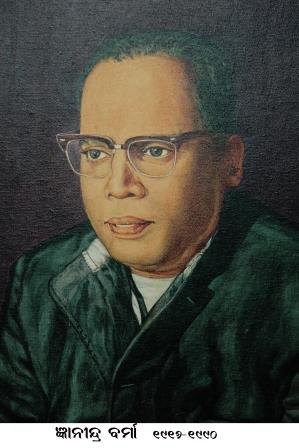Shree Gyanindra Berma
Died :- 19th Century
Place of Birth :- Kusupur, Cuttack

Poet Gyanindra Barma was one of the eminent poets and literary legends during the period of ‘Sabuja Juga’ (Green Age) of Odia literature and had enriched the Odia Literature through his writings for a period of nearly 35 years. He was born on 2 February, 1916 in a village of undivided Cuttack district, namely ‘Kusupur’, adjacent to ‘Lalitgiri’, ‘Ratnagiri’ and ‘Puspa Bihar’ hills known for Buddhist monasteries, by the side of river Birupa. This village is also the birth place of another noted poet ‘Palli Kabi Nanda Kishore Bal’, besides other literary legends of the locality like Abhimanyu Samanta Singhar, Ganakabi Baishnaba Pani and Pyarimohan Acharya. The poet had lost his father and mother in his childhood.
Despite a sea change in world literature during and after the First World War and the Second World War, Gyanindra Barma emerged as a romantic poet during the Second World War.
It would be seen from Barma’s literary works that besides being a poet he was also known as an Essayist, Dramatist, Story Writer, Novelist, Translator, Editor of Magazine and Journalist in newspapers in his time. He was also a Freedom Fighter and had been imprisoned for the cause. ‘Gyanindra Granthabali’ Part-I and Part-II were published during the year 1964 and 1968 respectively and its preface was written by famous writer and Editor Godabarish Mohapatra. ‘Gyanindra Granthabali’- Part-1 consists of the following poetry books:
Bole Hun’ti, Kalarei Phulla, Eka Ratri, Meghaduta, Eka Chhota Saharara Kahani, Pramilara Smruti, Duiti Surjyara Jibanee, Swarnajugara Sandhyaa and Swargara Lotaka.
Barma was a freedom fighter and later took to journalism as his livelihood. He was involved in the editing of the daily newspapers Samaj, Kalinga and News of the World. He edited the revived Ukal Sahitya magazine.
Barma came in close contact with Mayadhar Mansingh in his personal life and literary pursuits. Mansingh has recognised Barma as an independent thinker. He started writing in 1975 and continued his literary pursuit till his last days. He translated the poems of Whitman, Elliot, and Ezra Pound. From the beginning, he was a romantic artist. In his poem ‘Seemarekha’ he noticed the fusion of tradition and modernity. He introduced his originality, mindset and modernity with tradition in the background. The various images of women have blossomed in various ways. 'Priya Gaan' is one of his most meaningful poems reflecting rural consciousness. The contemporary era in Odia poetry was the era of Marxist realism. He wrote the ‘Story of a Small Town’ based on the problems and crises of a small town in the western part of Odisha. It can be taken as a silent protest Gangadhar Meher's love for pure mythology. According to Barma's poems included in the ‘Uttar Kabita’, Buddham Sharanam, ‘Dhusar nayika’, ‘Kabitar Atma’, Byathita Ashadha’, ‘Lyric’, ‘Bama Patha’, ‘Murti o Mandira’, ‘Jadabada’ ‘Paradip’, ‘Charana Kabira Mrutyu’, ‘Atmara Kabita’, ‘Atitara maya’ and ‘Buddha o Karl are the hallmarks of modernity and experimentation. He was deeply influenced by Karl Marx and materialism. Poems such as ‘Kalapahad’, ‘Hiranyakashipu’ and ‘Chandrasenara barta’ are borne out of the new valuation of history and myth. While he discusses the character of Hiranyakashipu in the context of realism in the poem ‘Hiranyakashipu’, Chandrasena’s claim of virility in the ‘Chandrasenara Barta’ is a sign of new consciousness.
Gyanindra Barma translated Kalidas' 'Meghaduta’. But in the case of poetry, his poems of the later stage are especially significant, which have been ignored by critics.
The 2nd volume of his Granhabali is a collection of novels which include: ‘Bhumika’, ‘Satabdira Swapna Bhanga’, ‘Lal Ghoda’, ‘Tinoti Hrudayara Kahani’, ‘Kumarika Sangha’, ‘Tanu o Atanu’, ‘Sesha Abhisara’, ‘Aparahnara Akash’, ‘Aranyara Kujjhatika’ and ‘Tamaso Mam Jyotirgamaya’. ‘Bhumika’ is considered to be the masterpiece among all his novels. From its style and thought it is the representative of typical Odia novels.
These novels are based on the pre-independence and post-independence environment. In each novel we can listen to a mixed voice of social realism tagged with historical background in some cases along with tragedy, sorrows, sufferings, oppression, exploitation and demolition of dreams. Barma's Marxist revolutionary, feminist views are clear in these books. He also wrote some revolutionary popular essays.
Gyanindra Barma was honoured with Odisha sahitya Akademi and Kendra Sahitya Akademi Awards for his great contribution to Odia literature.
Books
Eassays
Copyright © 2024 Odia Virtual Academy. All rights reserved Total Visitors- 1
Powered by: Odia Virtual Academy

